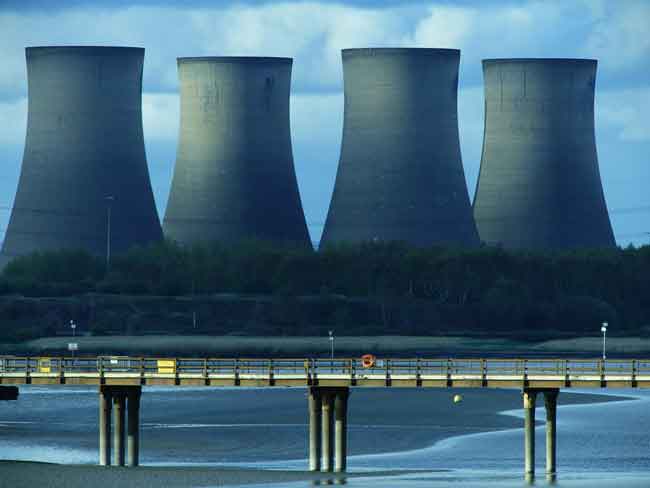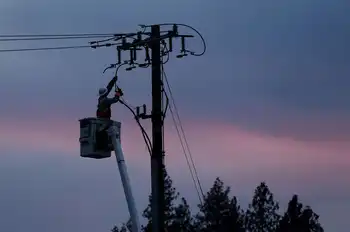Ontario considers banning old-style light bulbs
TORONTO, ONTARIO - Ontario is considering becoming the first province in Canada to follow Australia's lead in banning old-fashioned, energy-sucking light bulbs, Environment Minister Laurel Broten said as the province draws up a plan to cut its greenhouse gas emissions.
Conservative Leader John Tory and environmental groups are urging the government to ban incandescent bulbs in favour of energy-efficient ones, saying it's the push people need to save electricity and a move that would eliminate much of the province's dependence on coal-fired power plants.
"There are a lot of great ideas out there and that's one of them," Broten said. "Everything is on the table."
No one in Ontario should underestimate the importance of replacing standard bulbs with more energy-efficient ones, Broten added. By Premier Dalton McGuinty's estimate, replacing every old-fashioned bulb with an energy-efficient one would allow the province to shut down one coal-fired power plant.
"It is so important that Ontarians change those light bulbs," Broten said. "We're looking at other jurisdictions and the success that they're having."
Australia is banning the bulbs and says it will cut the country's emissions by four million tonnes by 2012. The move will also cut household power bills by up to 66 per cent, the country estimates.
California, which is widely considered to be on the leading edge of energy policy in North America, is debating a similar ban.
Ontario would be breaking ground in Canada if it started phasing out incandescent bulbs. The province has to do something to reduce harmful emissions, McGuinty said.
"We'll take a look at a host of options that might be available to us to help Ontarians better understand that we're entering into a new era," McGuinty said.
But Conservative Leader John Tory said the Liberals should stop mulling over options and act now. Ontarians want to be part of a solution to climate change, Tory said, and banning incandescent light bulbs is a good place to start.
"They need some leadership from the government," he said. "The question we should focus on is, when can we do this, and the answer should be as soon as possible. They should get on with it."
While the province has been pushing people to voluntarily switch to energy efficient bulbs, environmentalists say people will always go for the cheaper, inefficient bulbs as long as they are on the shelves.
"This technology is outdated, it's antiquated and it needs to go," said Chris Winter, executive director of the Conservation Council of Ontario.
Julia McNally, manager with Ontario's Conservation Bureau, said many provinces are trying to educate people about switching to energy-efficient bulbs. That's a good start, she said, but it doesn't change people's behaviour permanently.
"You need a ban," she said.
NDP Leader Howard Hampton said he would support a ban if it provides support for low-income residents. Some people should get a government-subsidized discount on their first few energy-efficient bulbs before the old-fashioned ones are phased out, he said.
“People want to do the right thing but they need some financial help and some regulatory help to get there,” Hampton said. “The government hasn’t done that.”
But Julia Langer, director of the global threats program at the World Wildlife Fund, said banning cheap bulbs is only part of the solution. Ontario has to adopt energy efficiency at every level, from building codes to fuel-efficient vehicles, she said.
The province simply must be more aggressive in its fight against climate change, Langer added.
"We have a climate crisis," she said. "We're running out of time. We have probably 10 years in which to do a yeoman's work to reduce greenhouse gases. The planet really can't take it anymore."
Others want to see the provincial Liberals go beyond light bulbs and look at protecting Ontario's boreal forest as part of its plan to reduce greenhouse gas emissions.
A group of 11 Canadian artists – including author Yann Martel, actor Cathy Jones, singer Sarah Harmer and artist Robert Bateman – have written a letter to McGuinty, urging him to protect swaths of the forest to counteract global warming.
"By protecting a few million hectares of intact forest, Ontario could safeguard vast quantities of carbon and be a leader in addressing climate change," states the open letter to McGuinty.
"A golden opportunity has landed in your lap. We urge you to take advantage of this unprecedented opportunity."
Related News

Why Atomic Energy Is Heating Up Again
ONTARIO - In recent years, nuclear power has experienced a remarkable revival in public interest, policy discussions, and energy investment. Once overshadowed by controversies surrounding safety, waste management, and high costs, nuclear energy is now being reexamined as a vital component of the global energy transition. Here's why nuclear power is "so hot" right now:
1. Climate Change Urgency
One of the most compelling reasons for the renewed interest in nuclear energy is the urgent need to address climate change. Unlike fossil fuels, nuclear power generates electricity with zero greenhouse gas emissions during operation. As countries rush to meet net-zero…




